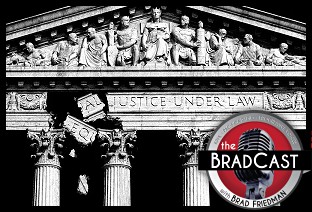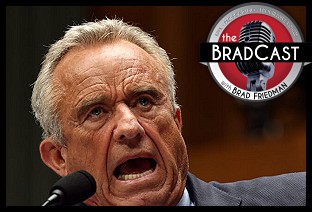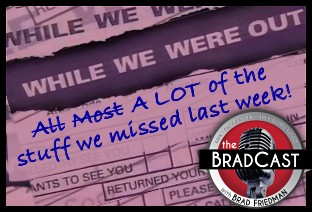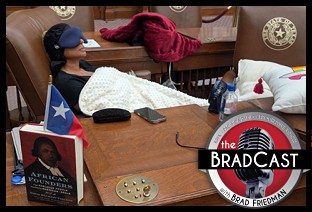READER COMMENTS ON
"Conyers Says PATRIOT Act Provisions 'Subject to Wide Spread Abuse'"
(29 Responses so far...)
COMMENT #1 [Permalink]
...
MarkH
said on 7/21/2005 @ 2:23 pm PT...
I don't know a lot about their politics, except what I've read in recent months here and elsewhere on the net, but...
Senator Boxer for President
Congressman Conyers for Vice President
!!!
Of course, it'll never happen and they wouldn't be elected anyway. Sigh.
What is the matter with Kansas?
What is the matter with America?
COMMENT #2 [Permalink]
...
Alison
said on 7/21/2005 @ 2:25 pm PT...
COMMENT #3 [Permalink]
...
Catherine a
said on 7/21/2005 @ 2:25 pm PT...
Thank goodness Conyers is keeping after this.
More in the same vein. The US is now effectively bringing its Patriot Act-style laws into foreign jurisdictions, starting with Ireland! The US has just concluded an extraordinary treaty with Ireland--with no public discussion or debate. This is really horrible. According to http://www.globalnewsmat...ile=article&sid=1866,
Treaty gives CIA powers over Irish citizens
US INVESTIGATORS, including CIA agents, will be allowed interrogate Irish citizens on Irish soil in total secrecy, under an agreement signed between Ireland and the US last week.
Suspects will also have to give testimony and allow property to be searched and seized even if what the suspect is accused of is not a crime in Ireland.
Under 'instruments of agreement' signed last week by Justice Minister Michael McDowell, Ireland and the US pledged mutual co-operation in the investigation of criminal activity. It is primarily designed to assist America's so-called 'war on terror' in the wake of the September 11 atrocities.
. . .
The deal was condemned yesterday by the Irish Council for Civil Liberties (ICCL) as "an appalling signal of how the rights of Irish citizens are considered by the minister when engaging in international relations". The ICCL said it appeared to go far beyond even what has been agreed between EU countries.
. . .
Although the Department of Justice insists that the arrangement merely updates existing agreements, it goes much further. The US may ask Irish authorities:
To track down people in Ireland.
Transfer prisoners in Irish custody to the US.
Carry out searches and seize evidence on behalf of the US Government.
It also allows US authorities access to an Irish suspect's confidential bank information. The Irish authorities must keep all these activities secret if asked to do so by the US.
COMMENT #4 [Permalink]
...
Mary59
said on 7/21/2005 @ 2:30 pm PT...
Unbelievable. Those pseudo-patriots doing all the strutting around, flag waving and Bible thumping are selling themselves and the country down the river.
My family by the way just started a couple cafe press sites and this one has a great Patriot Act design...check it out at www.cafepress.com/patriotact2
we'll have more designs but this is a good one for starters!
COMMENT #5 [Permalink]
...
Mary59
said on 7/21/2005 @ 2:31 pm PT...
COMMENT #6 [Permalink]
...
Constant
said on 7/21/2005 @ 2:32 pm PT...
#2 Allison, TY.
Looks like Ireland is now the 51st State complete with CIA landing strips for rendition to Egypt for torture and death.
How many other "wonderful treaties" does the US have withothers?
ANswer: Look at the "mutual protection" agreements the US required other nations to sign in re War Crimes. There are other things the US got in return for those agreements.
Hay, if you're losing a war against one ethnic group, why not piss off your allies and really stir up more scapegoats.
American government is doing exactly what the Roman Empire did: Pissing everyone off.
COMMENT #7 [Permalink]
...
COLLEEN
said on 7/21/2005 @ 2:51 pm PT...
Why is CIA/USA picking on Ireland? Are terrorists hiding there? Are they looking for IRA members?
COMMENT #8 [Permalink]
...
PetGoat
said on 7/21/2005 @ 3:39 pm PT...
Shannon airport is an important refueling spot for military flights.
CBS says 5500 soldiers have deserted. Somewhere I read that
many of them go missing at Shannon.
A chilling aspect of "sneak and peak" is that it's a license to "sneak
and spook." When your Uncle Henry sends you a DVD about
9/11 and the next week the DVD disappears, maybe you decide
that 9/11 isn't so interesting after all and that Uncle Henry is bad
news.
COMMENT #9 [Permalink]
...
Constant
said on 7/21/2005 @ 3:47 pm PT...
Conyers declaration shows us how significant things are. The stakes are high.
Yet, the RNC memos show up. It would appear as though there are defectors. Fantasy White House has come true.
How will the defectors within the RNC be embraced by those who want to assert the rule of law over this tyrant? Prepare yourselves to be more accomodating to the Right Wing. They are surfacing and sharing presents: You share a common tyrant.
COMMENT #10 [Permalink]
...
Dredd
said on 7/21/2005 @ 3:48 pm PT...
The Unpatriotic Act
Our civil accomplishments are in jail with no valid charges, being tortured, and all this without due process of law ... its the neocon way ... not the American way ...
COMMENT #11 [Permalink]
...
Prissy Patriot
said on 7/21/2005 @ 4:38 pm PT...
This is my first post to the BradBlog, but I have been looking at it for about a year...thank God for the internet!
Check out The Prissy Patriot..I have a lot of links to topics on this show, including the Vote/Bush/FL/OH Connection . These boys don't play, one investigator ended up dead...he was really getting the goods on them and he paid for it. A Florida Dept of Transportation Investigator, not some yokal PI....Prissy doesn't want to be the only who knows!
Look for "Coingate" -once that's frightened you like it did me, check out PrissyBalls to send to your representatives for a laugh. Prissy has a degree in Criminal Justice, not Business, like Dubya. She also went to class....
http://prissypatriot.blogspot.com
COMMENT #12 [Permalink]
...
COLLEEN
said on 7/21/2005 @ 5:41 pm PT...
Hey . I just read on RawStory that Rove and Skooter did lie to FBI. They are so screwed.
It's developing. More from Bloomburg later tonight.
COMMENT #13 [Permalink]
...
Mary59
said on 7/21/2005 @ 5:51 pm PT...
COMMENT #14 [Permalink]
...
Alison
said on 7/21/2005 @ 7:02 pm PT...
COMMENT #15 [Permalink]
...
Doug Eldritch
said on 7/21/2005 @ 7:17 pm PT...
ON C-SPAN NOW:
Grand Jury being called together for the OHIO bribery pay to play, Diebold, BOE coin scam and it implicates Blackwell plus Thomas Noe!
The OHIO GOP is exploding from the inside out like a nuclear bomb.
Doug E.
COMMENT #16 [Permalink]
...
anonymous
said on 7/21/2005 @ 10:44 pm PT...
Former Vietnam Combat and Commericail Pilot Firm Believer 9/11 Was Inside Government Jobhttp://www.lewisnews.com/article.asp?ID=106623
COMMENT #17 [Permalink]
...
unirealist
said on 7/22/2005 @ 5:46 am PT...
...and the NY police are doing random searches of people on the transit systems. "Excuse me, we'd like to check your backpack." If you say no, you aren't allowed to ride.
Sound reasonable? Go a step further. You are randomly stopped on the highway. "Excuse me, we'd like to search your car." If you say no, you are not allowed to DRIVE any further. "Sorry, you will have to leave your vehicle and proceed on foot."
Go a step further. A voice interrupts your phone conversation. "Excuse me, we'd like to listen in--do you mind?" If you object, you have to hang up.
Go another step. Government technicians arrive at your home. "Excuse us, we'd like to install mikes and videocameras in your rooms." If you refuse, you can't live there anymore.
Man, it's a slippery slope.
COMMENT #18 [Permalink]
...
PetGoat
said on 7/22/2005 @ 6:44 am PT...
After the 7/7 bombings, a lot of people including WinterPatriot were
quick to judge it an inside job. I thought this was crazy and that
there was no conceiveable benefit to Bush.
I didn't know then that the USAPatriot vote was coming up and that
the bombings and the vote would be linked as they were.
I guess the issue is now an open one for me. I guess there are
about 250 Members of Congress that need to be voted out.
COMMENT #19 [Permalink]
...
Joan
said on 7/22/2005 @ 8:58 am PT...
#18, yeah, good luck voting them out.
#11, all the things you mention--Coingate, dead DOT guy, etc., have been discussed on this blog for a very long time. See 'Clint Curtis/Tom Feeney/Yang Enterprises' item top-right of this page. Not to seem uppity or nothin', but if you've been here for a year....
#1, Hey, No! You got that backwards, Mark!
CONYERS for president. Absofuckinglutely. GOD I hope he runs. And he could pick any damn vp his little heart desires!
'Course don't forget, nobody's going anywhere via voting till we clean up the voting process, but if/when that happens, I think Conyers would generate the biggest landslide victory in the history of mankind.
COMMENT #20 [Permalink]
...
Otto
said on 7/22/2005 @ 11:27 am PT...
This is a no-brainer. When the people of a democracy feel threatened, just throw all that freedom and democracy away. Hitler, Mussolini, Franco and Salazar all did it and it worked. I shore wouldnĺt have wanted to live there, but it looks like we have no choice.
COMMENT #21 [Permalink]
...
Arry
said on 7/23/2005 @ 12:28 pm PT...
Re: # 18 - That was my thought on waking up this morning. I believe the "PATRIOT" Act is the keystone of the coup, and we shouldn't discount what they may do to ensure its "permanence".
It's the Bill of Rights or the "PATRIOT" Act. It can't be both. The constitutional rights of citizens can't be a privilege bestowed or taken away by the executive branch, which after all of the words about security, freedom, etc., is exactly what much the "PATRIOT" Act does. It makes the Bill of Rights meaningless.
The "PATRIOT" Act will never be "permanent" as long as true patriots still exist.
COMMENT #22 [Permalink]
...
Joan
said on 7/23/2005 @ 8:49 pm PT...
#21
"It's the Bill of Rights or the "PATRIOT" Act. It can't be both."
Yes, and when taking the oath of office doesn't the president swear to "preserve, protect & defend the Constitution of the United States"?
Does that have actual legal weight, or is it just empty ritual?
The Downing Street house party I attended tonight was disappointing in that, despite good people with much passion, there was little organization, no plan for directing that passion into practical outlets. It left me feeling that our efforts are too scattered and wishing that somehow all these disparate groups must unify, though I have no idea how.
I was glad that at least I brought material from the Whispering Campaign to give out, though that felt like so little to do.
I will continue to do it, though.
Sorry for going O.T.....
COMMENT #23 [Permalink]
...
TateMatthews
said on 7/23/2005 @ 9:25 pm PT...
:satisfied: One thing you can do is go to Conyers Blog http://www.conyersblog.us/ and report the above. There are some interesting posts on 911 and very upset people about Cheney losing it and being about to attack Iran. These sites keep disappearing and I was booted off AOL when was reading a link from a Democratic Underground thread with someone who was also upset about the new news about Cheney giving orders to attack Iran.
Hopefully the military will refuse to obey the orders of THE VICE PRESIDENT WHO HAS NO AUTHORITY TO IMPLEMENT A NUCLEAR WAR.
People who were too ill or disabled to attend are waiting for information from those who hosted or attended the DSM parties and Conyers has set aside a special blog thread at the top for the DSM attendees but only one person has reported in - the other posts are interesting and important but if I were Conyers I would feel disappointed at the lack of DSM attendee blogs.
Maybe after people rest tonight they will start blogging their experiences and impressions of the DSM parties. In reading about THE RESISTANCE in WWII people had to play it by ear, they were just convinced that the Nazis had to be stopped and ideas came to them.
Bev Harris wrote that the resistance should not be too centralized stating it was easier to cut off a head than a swarm.
The parties, the blogs, the sites, the truth give the ones in the Oligarchy who are said to be in Civil War mode over the suicidal plans of the PNAC including Bilderberg, Congress including Republicans, the CIA, FBI, other countries intelligence agencies and despite Rumsfeld's purge, the top military are leaking Cheney's insane intensions and many right wing sources are linking Cheney's mentally ill actions.
We must encourage those in the above organizations by showing them not all Americans are fooled and their may be plans for removal of the Bush Regime by those who can, soon.
Keep blogging and showing their is vital dissent to the murderous bush regime.
http://www.conyersblog.us/
COMMENT #24 [Permalink]
...
Arry
said on 7/23/2005 @ 11:02 pm PT...
#22 Joan said - "when taking the oath of office doesn't the president swear to "preserve, protect & defend the Constitution of the United States"?
Does that have actual legal weight, or is it just empty ritual?"
Well, I suspect it could be subject to legal - certainly impeachment - provisions. Failure to "preserve, protect & defend the Constitution" and to actively undermine it would be, and is, clear treason in the position of the president.
Holding public officials to their oaths of office has been one of the most effective and inspiring aspects of many of the local anti-"PATRIOT" resolutions. It is amazing to see a gradual evolution in understanding from a vague "We have to make sacrifices in these times" to "I swore an oath of office, and I will abide by it" after informed citizens make it clear that they insist on an answer - "Will you or won't you abide by the oath you took to preserve and protect the Constitution?" and make it clear specifically that they can't have it both ways - Constitution and "PATRIOT" Act. Lots of activity across the country which I believe will prove a very good thing to have done in the coming years. It is just as real as what is happening in Washington.
Your other point about how we should be organized is a huge one and one we should be discussing somewhere. Personally, I believe the internet has been a godsend and likely revolutionary and will continue to be central, but we have to look into other means of communication and decentralized organization as well. Variety within a clear focus is the key to flexibility and durability. We have plenty of history and inspiration to draw from, and we all ought to realize - intellectually and viscerally - that we are the ones making history now. We are not spectators, it isn't a movie, we can't expect the corporate culture to solve our problems, keep us informed, tell us the truth, nurture us. (I could go on a long time with this.:) and you all know it anyway.) I guess I'm just getting to the point that a seriousness of purpose and realization of the necessity of individual responsibility have to be underpinnings of organization.
COMMENT #25 [Permalink]
...
Joan
said on 7/24/2005 @ 7:22 am PT...
Arry,
I agree with all that. And Tate, thanks, I will go to Conyers' blog & do that.
One interesting note: I heard on Air America that there were Downing Street meetings in Europe yesterday as well, at least in Prague & in Germany, a caller said. I would think in Britain too.
I fear the internet being fucked with. That MUST be on their agenda, to shut down communication among us. Someone from AfterDowningStreet was on also, talking about how...is it Symantic?...had blocked their emails as if they were spamming. It was rectified, but it was easily done.
People need to make hard copies of information, I think, like the info from the Whispering Campaign, as back-up in case it all disappears one day in a puff of neocon smoke.
Ah, paranoia....
COMMENT #26 [Permalink]
...
k ols
said on 7/24/2005 @ 1:42 pm PT...
I thought I read that part of the Patriot Act included the government spying on our E-mail subject lines.
If the subject line looks suspicion I'm sure they will read the E-mail too.
COMMENT #27 [Permalink]
...
Arry
said on 7/24/2005 @ 3:49 pm PT...
Looking at my last posting - #24 - I see the last paragraph is a bit confusing - as usual trying to get too much into too little space.
There are two aspect to my comments about the internet. 1.) I think it is a legitimate to be concerned about complete reliance on internet communications. George Tenet, awhile back said, in speaking of the need for more internet security - "I know that these actions will be controversial in this age when we still think the Internet is a free and open society with no control or accountability, but ultimately the Wild West must give way to governance and control." (here among other places) 2.) I think building other ways of communication and diversified organization will give us more durability - we'll develop our own ecosystem, so to speak, which will be healthier than a more restricted mode of working. But, no doubt about it, the internet and particularly blogs are changing the world for the better in the trajectory we are now on.
The other comments in the paragraph were meant to emphasize the necessity of very consciously being part of the spectrum of historical movements of liberation, to take ourselves seriously as the civil rights movement, for example, took itself seriously. In such a case, a serious commitment entails self-liberation - a very great thing - and consequent blossoming of creativity. We are getting there, but I think there is still some holding back, thinking that some residual good-luck charm still clings to the "American way of life" (possibly explaining our sometimes lack of organization and drifting and frustrating meetings, for example, that Joan encountered). No, we're the ones to put the magic back into it.
Enough of this. Just wanted to explain what I wrote last night very late.
Back on topic: We've found Dr. Abele's dispassionate analyses at the "PATRIOT" Act and "PATRIOT" II - although written a couple of years ago - to be very good compact digests of the primary provisions. here and here
More Big Brother
COMMENT #28 [Permalink]
...
Arry
said on 7/24/2005 @ 4:02 pm PT...
"We've found Dr. Abele's dispassionate analyses at the "PATRIOT" Act and "PATRIOT" II..."
Of course, that's "Dr. Abele's dispassionate analyses *of" the "PATRIOT" Act...
COMMENT #29 [Permalink]
...
sdsa
said on 7/25/2005 @ 8:23 am PT...


 'Green News Report' 9/18/25
'Green News Report' 9/18/25
 MAGA Exploiting Kirk's Death as Their 9/11: 'BradCast' 9/17/25
MAGA Exploiting Kirk's Death as Their 9/11: 'BradCast' 9/17/25 Our Crumbling Courts and Withering Rule of Law: 'BradCast' 9/16/25
Our Crumbling Courts and Withering Rule of Law: 'BradCast' 9/16/25 'Green News Report' 9/16/25
'Green News Report' 9/16/25 After Kirk Murder, First Amendment, But Not Second, Under Attack. Prove Me Wrong: 'BradCast' 9/15/25
After Kirk Murder, First Amendment, But Not Second, Under Attack. Prove Me Wrong: 'BradCast' 9/15/25 Sunday 'False Narrative' Toons
Sunday 'False Narrative' Toons SCOTUS Suspension of 4th Amendment Rights Poses Ominous Threat to Constitutional Republic
SCOTUS Suspension of 4th Amendment Rights Poses Ominous Threat to Constitutional Republic 'Dark Moment for America': 'BradCast' 9/11/25
'Dark Moment for America': 'BradCast' 9/11/25 Kirk Assassinated in UT; Shutdown Battle Takes Shape in D.C.: 'BradCast' 9/10/25
Kirk Assassinated in UT; Shutdown Battle Takes Shape in D.C.: 'BradCast' 9/10/25 Despite Voting Co. Lawsuit, Fox Ready to Shout Fake 'Fraud' Again: 'BradCast' 9/9
Despite Voting Co. Lawsuit, Fox Ready to Shout Fake 'Fraud' Again: 'BradCast' 9/9  'Green News Report' 9/9/25
'Green News Report' 9/9/25 Trump Readies Wars on Venezuela and Chicago: 'BradCast' 9/8/25
Trump Readies Wars on Venezuela and Chicago: 'BradCast' 9/8/25 Sunday 'Big Ball Room' Toons
Sunday 'Big Ball Room' Toons 'Green News Report' 9/4/25
'Green News Report' 9/4/25 RFK Jr.'s War on the Science of Public Health: 'BradCast' 9/4/25
RFK Jr.'s War on the Science of Public Health: 'BradCast' 9/4/25 Trump's 'Cook'ed-Up Mortgage Fraud Claims: 'BradCast' 9/3/25
Trump's 'Cook'ed-Up Mortgage Fraud Claims: 'BradCast' 9/3/25 While We Were Out: 'BradCast' 9/2/25
While We Were Out: 'BradCast' 9/2/25 Hypocrisy Behind RW Opposition To CA 'Election Rigging Response Act'
Hypocrisy Behind RW Opposition To CA 'Election Rigging Response Act' CA's 'Deterrence' Map; Trump's 'Fascist Theatre': 'BradCast' 8/21/25
CA's 'Deterrence' Map; Trump's 'Fascist Theatre': 'BradCast' 8/21/25 Trump's 'Stalinesque' Plot to Whitewash History: 'BradCast' 8/20/25
Trump's 'Stalinesque' Plot to Whitewash History: 'BradCast' 8/20/25 TX GOP Imprisons Dem State Lawmaker in State House: 'BradCast' 8/19/25
TX GOP Imprisons Dem State Lawmaker in State House: 'BradCast' 8/19/25 Trump, Nazis and Trump's Nazified Elections: 'BradCast' 8/18/25
Trump, Nazis and Trump's Nazified Elections: 'BradCast' 8/18/25
 VA GOP VOTER REG FRAUDSTER OFF HOOK
VA GOP VOTER REG FRAUDSTER OFF HOOK Criminal GOP Voter Registration Fraud Probe Expanding in VA
Criminal GOP Voter Registration Fraud Probe Expanding in VA DOJ PROBE SOUGHT AFTER VA ARREST
DOJ PROBE SOUGHT AFTER VA ARREST Arrest in VA: GOP Voter Reg Scandal Widens
Arrest in VA: GOP Voter Reg Scandal Widens ALL TOGETHER: ROVE, SPROUL, KOCHS, RNC
ALL TOGETHER: ROVE, SPROUL, KOCHS, RNC LATimes: RNC's 'Fired' Sproul Working for Repubs in 'as Many as 30 States'
LATimes: RNC's 'Fired' Sproul Working for Repubs in 'as Many as 30 States' 'Fired' Sproul Group 'Cloned', Still Working for Republicans in At Least 10 States
'Fired' Sproul Group 'Cloned', Still Working for Republicans in At Least 10 States FINALLY: FOX ON GOP REG FRAUD SCANDAL
FINALLY: FOX ON GOP REG FRAUD SCANDAL COLORADO FOLLOWS FLORIDA WITH GOP CRIMINAL INVESTIGATION
COLORADO FOLLOWS FLORIDA WITH GOP CRIMINAL INVESTIGATION CRIMINAL PROBE LAUNCHED INTO GOP VOTER REGISTRATION FRAUD SCANDAL IN FL
CRIMINAL PROBE LAUNCHED INTO GOP VOTER REGISTRATION FRAUD SCANDAL IN FL Brad Breaks PA Photo ID & GOP Registration Fraud Scandal News on Hartmann TV
Brad Breaks PA Photo ID & GOP Registration Fraud Scandal News on Hartmann TV  CAUGHT ON TAPE: COORDINATED NATIONWIDE GOP VOTER REG SCAM
CAUGHT ON TAPE: COORDINATED NATIONWIDE GOP VOTER REG SCAM CRIMINAL ELECTION FRAUD COMPLAINT FILED AGAINST GOP 'FRAUD' FIRM
CRIMINAL ELECTION FRAUD COMPLAINT FILED AGAINST GOP 'FRAUD' FIRM RICK SCOTT GETS ROLLED IN GOP REGISTRATION FRAUD SCANDAL
RICK SCOTT GETS ROLLED IN GOP REGISTRATION FRAUD SCANDAL VIDEO: Brad Breaks GOP Reg Fraud Scandal on Hartmann TV
VIDEO: Brad Breaks GOP Reg Fraud Scandal on Hartmann TV RNC FIRES NATIONAL VOTER REGISTRATION FIRM FOR FRAUD
RNC FIRES NATIONAL VOTER REGISTRATION FIRM FOR FRAUD EXCLUSIVE: Intvw w/ FL Official Who First Discovered GOP Reg Fraud
EXCLUSIVE: Intvw w/ FL Official Who First Discovered GOP Reg Fraud GOP REGISTRATION FRAUD FOUND IN FL
GOP REGISTRATION FRAUD FOUND IN FL

































